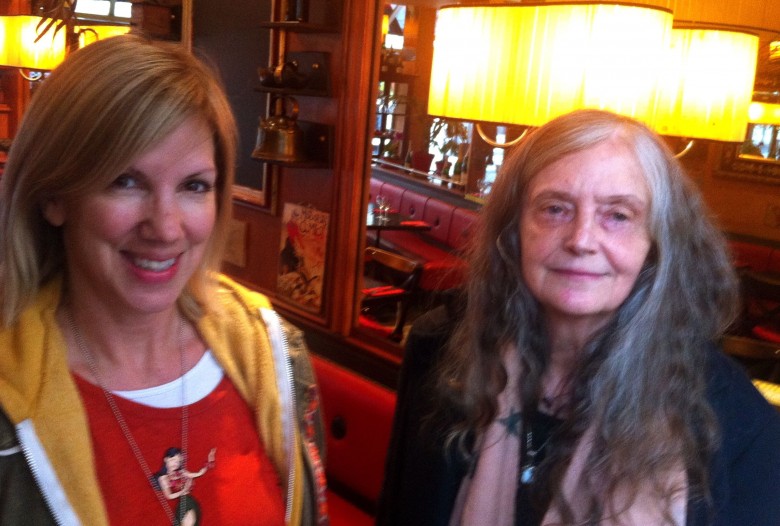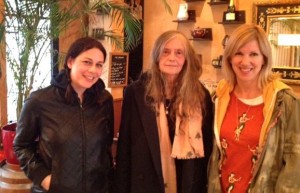In May of 2014 I participated in Aller Retour Paris: a week of art, poetry, film, and music in the heart of Paris, celebrating the city’s role in shaping Henry Miller as a writer and raconteur. Ping-Pong literary journal hosted the opening night party at Shakespeare and Company. Reading poetry while looking at Notre Dame Cathedral is kind of wondrous. I hope I never get to that place where I think that isn’t the coolest thing on earth, cuz it kinda is. I figured since I was in Paris I’d see about interviewing one of my favorite poets, Alice Notley, who kindly agreed. J. Hope Stein, my friend and newest poetry editor at Ping-Pong also came along, and together we had tea and conversation with a woman who makes life itself an art, like Henry says is the trick of the whole thing. What follows is a shortened version (you have to buy the print copy of Ping-Pong to read it in its entirety).
Alice Doesn’t Live Here Anymore
the (partial) interview with Alice Notley
by: Maria Garcia Teutsch and J. Hope Stein
May 2014 at a café in Paris, France
MGT
I find a playfulness with language and punctuation in your writing with the things that bind our language and in some ways release them. And I’m wondering if in English you find there are more boundaries on the language than you do in the French?
Alice
No (laughs). No, because English is my first language and for me it has no boundaries. But I don’t think one has more or fewer boundaries than the other.
MGT
In French everything is gender, and I know in German everything is gendered.
Alice
In English a lot is gender and nobody notices it. And if you speak a language you don’t notice it. I don’t notice it so much in French. Mostly I strive to master it so I can speak the language. The words you expect to be feminine are never feminine. It never works the way it’s supposed to. It all comes from Latin. I took Latin in high school and I know that gender is always unexpected. (Laughs)
MGT
In The Language of Heaven you present wonders beyond our philosophy. I’m wondering if poetry can be that membrane, that osmosis, that lets us walk between those different worlds?
Alice
I think so. That’s what I write. I’m always in investigation to find the other world, that part of myself, and in order to try to find it I have to bend the language and talk in unordinary ways. But I also do want to take the reader with me.
MGT
And I think you do, you take us on these wonderful journeys. And also give us a consciousness about how we use language, even with the playfulness, I find, in the punctuation. You say it’s a tool of measurement, a measuring device.
Alice
It’s part of my materials. Anything we use in the language is part of my materials. I can do anything I want to with that language. I can mix it with French if I want to, I can mix it with Latin if I want to. I can borrow usages from the two languages.
American poetry has already borrowed quite a bit from French poetry in the way that French is differently punctuated. For example, quotation marks are not there in French. American poetry got its lack of punctuation from Apollinaire.
In French, if you have a novel and you have conversation and you have an open quotation mark — it’s not a quotation mark, it’s the arrows — often you don’t punctuate at the end when you say “he said” so everything kind of runs together. When Apollinaire published the first edition of Alcools, he did something that was sort of natural to French. He left all the punctuation out. It seems more radical to Americans than it does to French people.
MGT
The form that you have is completely original, but it’s a scaffolding and you understand that you’re in another place of poetry. You talk about coming after this distinct feminine form. Who else is doing that? Anne Waldman does it with her chants for peace in the world. You do it with your changing form. The French theorist Helene Cixous said we should in feminine writing.
Alice
But I don’t consider my forms to be feminine. What I wanted to do was create a space for me to speak and I wasn’t going to be allowed to as a woman. I wasn’t going to be allowed to because I was a woman. So I said “feminine epic” just to say, “I’m here, I’m not the gender you’re expecting. But take it and dig it.” But I actually don’t care if my form is feminine or not. I don’t read Cixous.
I used the words “feminine epic” because I wanted to write a story that was told from the point of view of a woman and not a man. I wanted it to be a traditional epic told from the point of view of a female hero, not a male hero, and I used the conventions of the epic, which are male. I mean they’re totally male, that’s what they are, and I turned that upside down. But I’m not interested in the idea of a female form, Écriture féminine, no, no, I don’t care about that. (Laughs)
For Part II of our truncated interview visit www.poetrycrush.com
You can also visit the Henry Miller Library’s blog post about it here:
For the full text you can purchase Ping-Pong 2014 HERE



nice! learned a few things.
[…] the new issue of Ping-Pong there is a 20-page conversation between Alice Notley, Maria Garcia Teutsch & I which took place in a cafe in Paris earlier this year. In person I would describe Notley […]
Excellent way oof telling, and pleasant post to get facts regarding my presentation focus, which i am going to
present in school.